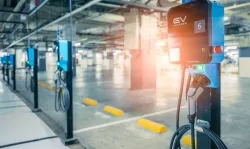
Table of Contents
How to Use Cellular Routers for EV Charging: Keeping Your Chargers Online, Always
Introduction
As EV adoption soars, reliable connectivity for EV chargers is more critical than ever. Whether at workplaces, public parking, or fleet depots, maintaining a stable, secure link to the internet ensures seamless operation, diagnostics, payment processing, firmware updates, and analytics. At 5Gstore, we specialize in robust cellular roaming routers built for uninterrupted connectivity—even in the most remote or variable coverage scenarios.
Why Cellular Routers Are a Smart Choice for EV Charging
- Greater Reliability than Wi‑Fi: Wi‑Fi networks—especially in public or commercial settings—can suffer from interference, weak signal coverage, or security vulnerabilities. In contrast, cellular connections (especially 4G LTE and newer) run on licensed, regulated spectrum that offers broader, more reliable coverage, particularly in remote or underserved areas. Plus, cellular avoids exposing local network infrastructure to security risks.
- Secure and Segmented: With cellular routers, your EV charging network stays isolated from local enterprise Wi‑Fi, minimizing attack surfaces and improving cybersecurity.
- Remote Management & Analytics: Cellular connectivity enables real‑time diagnostics, telemetry, smart charging control, and remote firmware updates—vital for optimizing uptime and performance.
EV Charger Data Usage: What’s Typical?
Exactly how much data does an EV charger use monthly? It varies based on reporting intervals, the number of sessions, and communication protocols—but here’s what real-world users and integrators report:
“I would estimate though 200 MB – 300 MB per month.”
That estimate comes from a practitioner on an OCPP forum discussing chargers with SIM cards. So budgeting around 200–500 MB per charger per month is a practical baseline—though highly dependent on settings like heartbeat frequency, meter data logs, firmware updates, etc.
Typical Monthly Data Breakdown (Estimated, per Charger)
| Data Type | Approx. Monthly Usage |
|---|---|
| Heartbeat/Ping & Meter Readings | ~100–200 MB |
| Firmware Updates & Diagnostics | ~50–150 MB |
| Transaction & Payment Logs | ~10–50 MB |
| Total Estimated Range | ~200–500 MB/month |
Common Connectivity Issues & Smart Solutions
- Coverage Gaps or Carrier Outages
Solution: Use routers with multi-SIM or multi-carrier capabilities. Devices automatically switch between carriers based on signal quality to stay connected—even if one network goes down or loses coverage. - Unexpected Data Spikes (e.g., Firmware Updates)
Solution: Select data plans with buffer allowances, or implement data-usage alerts. Smart routers can throttle non-critical traffic or delay large downloads to off-peak periods. - Security Threats
Solution: Cellular separates the charging network from local infrastructure. Pair that with VPNs, firewalls, and regular firmware updates to safeguard the network—critical measures for public or fleet deployments. - Latency-sensitive Operations or Remote Control
Solution: Prioritize newer and faster cellular standards like LTE or even emerging 5G support, especially if managing high-volume chargers or relying on real-time remote diagnostics.
Best Practice Tips for Managing Cellular-Connected EV Chargers
- Use Multi-Carrier SIMs or Dual SIM Routers: This ensures redundancy—if one provider experiences downtime or poor coverage, service remains seamless.
- Monitor Data Usage Per Charger: Track usage trends monthly, allocate budgets per unit, and look for anomalies—e.g. unexpectedly high volumes pointing to misconfigurations or excessive firmware pulls.
- Plan for Firmware Updates: Stagger these across times of low usage, or pre-fetch them via Wi-Fi (if security-compliant) to prevent exceeding monthly data allocations.
- Leverage Automated Alerts: Set routers to flag loss of connectivity, data threshold breaches, or unauthorized configuration changes.
Why 5Gstore Is Your Ideal Partner
At 5Gstore.com, we offer specialized routers engineered to support demanding, always-connected applications like EV charging. Our solutions include:
- Multi-SIM & Multi-Carrier Support: Failover across providers keeps your charger online, no matter what.
- Carrier-Grade Security Features: VPNs, firewalls, and encrypted links ensure your charger network stays protected.
- Fail-Safe Operation in Remote Locations: Even where options are limited, our routers maintain connectivity.
- Centralized Management: Easily configure, monitor, and update from the cloud.
Explore our options tailored to “Parking & EV Charging” needs right here: 5Gstore: 5G-Enabled Parking and EV Charging
Wrapping Up
- Data Needs Are Modest—but Critical: A typical EV charger may use 200–500 MB/month, depending on you heartbeat rate, updates, and telemetry.
- Resilience Is Essential: Coverage disruptions or data surges can derail operations—multi-SIM, multi-carrier routers are the safeguard.
- Security Counts: Cellular networks reduce exposure, and layered security ensures peace of mind across public and fleet deployments.
- 5Gstore Has You Covered: With robust routing options, advanced management, and support tailored to EV charging, we’re the partner to help you stay connected.
Contact the experts at 5Gstore to assist you with your EV Charging plans. Cellular routers from Teltonika, Peplink & Semtech are great for EV Charging.

